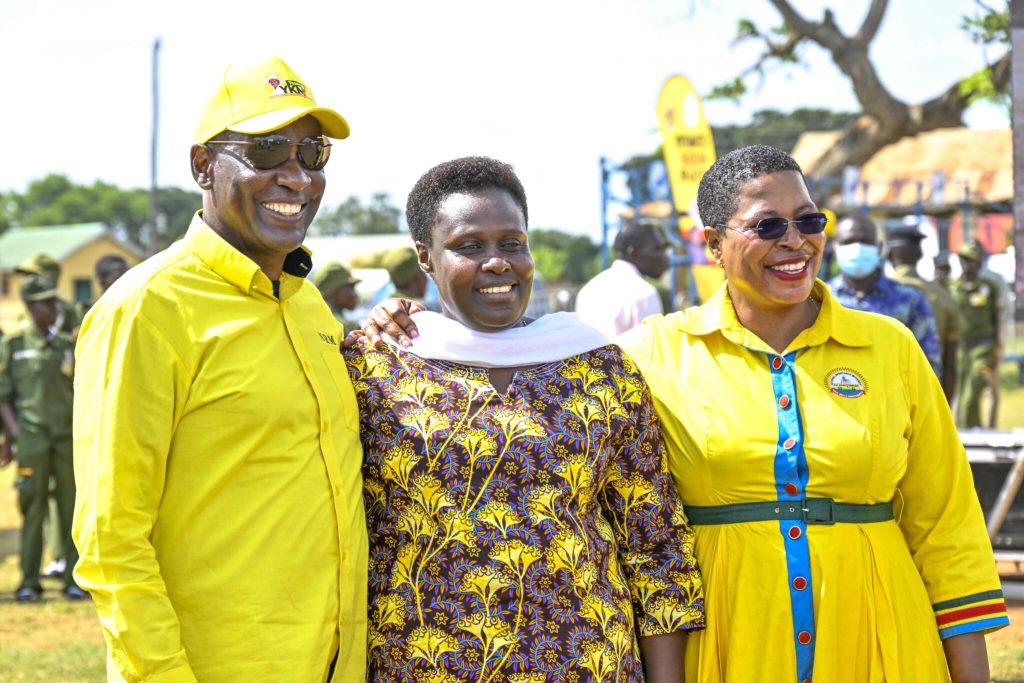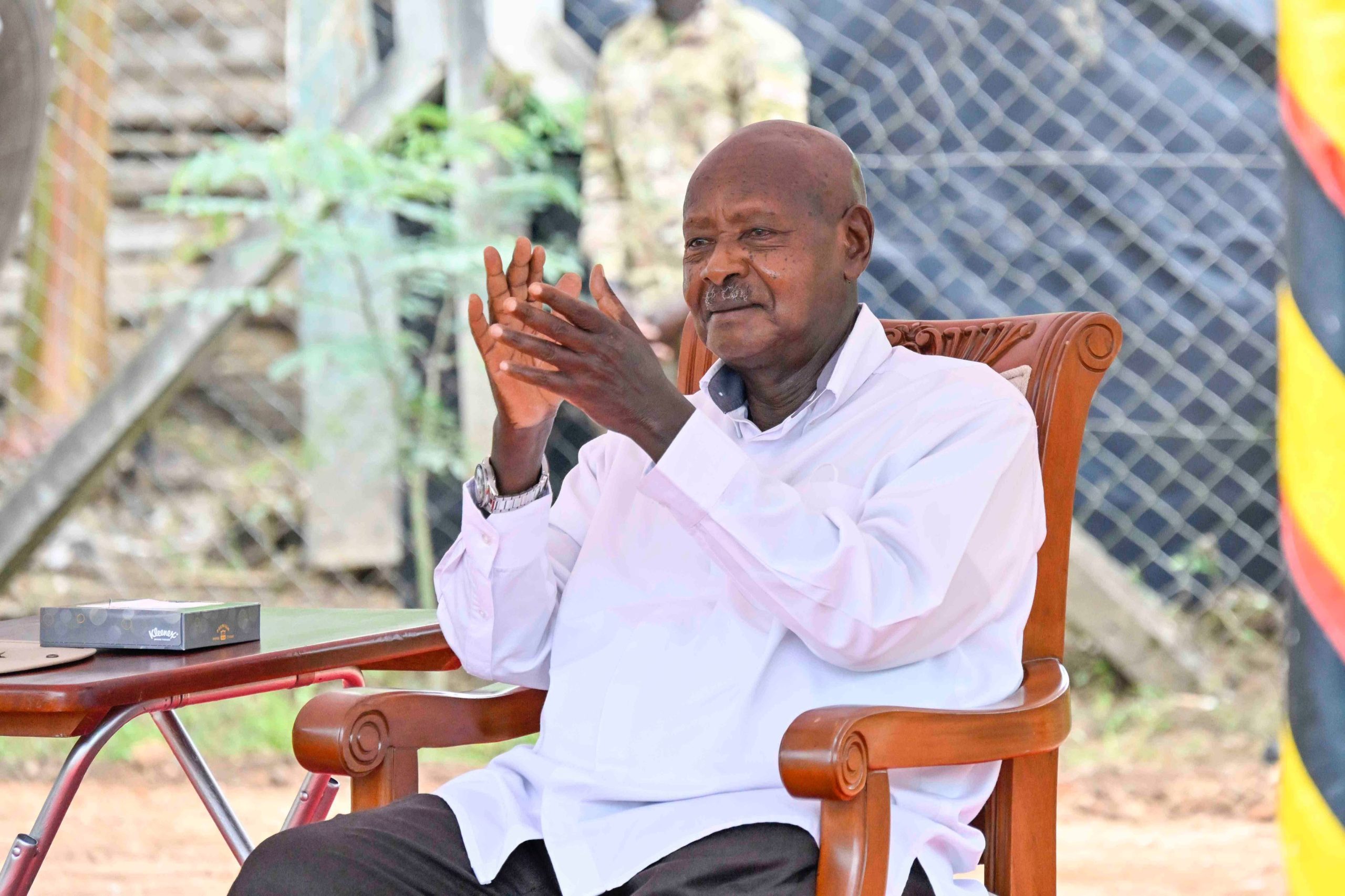
Regional Police Commanders (RPCs) have received a strong direction from President Yoweri Kaguta Museveni that forbids issuing police bonds to anyone suspected of embezzling money for the Parish Development Model (PDM) and Emyooga projects.
The President emphasized the significance of protecting money intended to improve Uganda’s village economies while speaking to the leaders of the Teso subregion today at Kumi Municipal Grounds.
This occurred on the second day of the Teso Sub-region Presidential wealth creation evaluation visit, which started on Monday, November 18, 2024.
“I’ve heard from ISO regarding people embezzling PDM funds. “Police bonds were granted to some who were arrested,” the president said.
“I now oversee the RPCs; anyone found guilty of stealing PDM or Emyooga funds will no longer be subject to police bonds. I will personally “bond” you if you provide a police bond.
Additionally, President Museveni pledged to work with the Chief Justice to stop these abuses and cautioned that such leniency jeopardizes efforts to protect the village economy.
“This funding will be used to improve communities. Refunding is insufficient if someone steals it; you also risk going to jail. Did you receive it as a gift? He posed the question rhetorically.
Uganda’s progress depends on the PDM and Emyooga money, which must be safeguarded at all costs. With this money, no one should play games. Additionally, he said, “We are changing lives, and we won’t let anyone stop that mission.”
The practice of taking bank fees out of PDM funds before they are distributed to beneficiaries was also criticized by the president.
“I insist that all bank fees be covered by the Ministry of Finance. “Recipients must receive their entire amount, without any additions or deductions,” he said.
However, President Museveni reaffirmed the necessity of altering social perceptions, which he called “the problem of sleep.”
Based on his personal experiences, he described how learning about world history in the 1960s motivated him to question the notion that Africa’s problems could not be solved.
Sleep is Africa’s dilemma. It’s incredible how people can be so oblivious to their own abilities. He said, “Some people told me in the 1960s that Banyankole could never change.”
“I disagreed; after becoming a Christian, my own mother, who was a conventional woman, transformed. She gained knowledge of knitting, ironing clothes, and boiling milk. “Why can’t we change if she could?” he said.

President Museveni also addressed environmental conservation and sustainable development, particularly the misuse of wetlands for rice farming.
He called for a shift towards fish farming as an alternative that benefits both the environment and the economy.
“I visited Limoto Wetland Restoration Center in Pallisa and found that when people stopped growing rice in the swamp and adopted fish farming, their income grew significantly. One family now earns sh 62m annually from fish ponds, compared to sh1m from rice farming,” President Museveni said.
He explained that fish ponds located at the edges of wetlands not only protect the environment but also provide a sustainable source of income.
“This approach restores the swamp, secures water for irrigation, and helps families get out of poverty,” he added.
The President expressed satisfaction with the impact of PDM in many parts of Uganda, noting that the initiative has enabled people to invest in livestock, poultry, and other income-generating activities.
President Museveni assured the public of continued support for PDM, with sh 100 million allocated annually per parish.
Additionally, he revealed plans to use centres like Serere to breed animals and multiply foundation seeds through zonal centres to further boost agricultural productivity.
He further shared a reflection on Uganda’s journey toward prosperity, emphasising the ideological differences that shaped the country’s economic and political landscape since the 1960s.
The President highlighted the strategies the NRM government adopted to transform Uganda’s economy and uplift its citizens.
“The issue of prosperity is not new to us. Even before independence, we debated it passionately as young people in the 1960s. Our vision was prosperity for all, but some of the older generation thought it was impossible.”
President Museveni recounted a conversation with a prominent figure at the Uganda Club, who argued that societal inequality was inevitable, likening it to the differing lengths of human fingers.
“I told him, that’s biology, sir, but we are talking about socio-economic equality. Let’s give everyone an equal opportunity to succeed,” the President remarked.
He further criticised the divisive politics of identity, which focuses on tribe and religion, noting that it hinders national unity and economic progress.
“Prosperity knows no tribe or religion. If someone from another tribe buys my milk or beef, they are supporting my prosperity. This is why we rejected identity politics and embraced the politics of shared interests,” President Museveni said.
By the late 1960s, the ideological divide between those advocating for “prosperity for all” and others who supported “prosperity for some” became evident.
This divide, coupled with the turbulent political environment, prompted the emergence of alternative movements, such as the National Resistance Army (NRA) which later transformed into the National Resistance Movement (NRM).
“When Amin came to power, we decided that advising was no longer an option. We began building an alternative force politically and militarily. By 1986, when we came into government, the country had lost 24 years with no army, no development, and no economy,” he said.
Reflecting on the government’s post-1986 strategy, President Museveni outlined four key sectors that could drive wealth creation.
The President encouraged Ugandans to engage in commercial agriculture, including livestock, crops, fisheries, and agroforestry, as a pathway to personal wealth and job creation.
He noted that small-scale traditional farming could not lift families out of poverty.
“We moved from subsistence agriculture to commercial agriculture, emphasising productivity and profit,” he said.
He highlighted the growth of the manufacturing sector, now employing 1.2 million Ugandans, surpassing the 480,000 employed in public service.
“From small dairy coolers to large factories, manufacturing has become a significant employer and driver of wealth,” President Museveni observed.
“The services sector, including tourism, transport, professional services, and religious work, has also flourished. We estimate about four million Ugandans are employed in this sector,” the President stated.
President Museveni also pointed to the rising potential of ICT, such as business process outsourcing, where Ugandans can work remotely for international companies.
“With strong telecoms and internet infrastructure, our people can now earn globally competitive wages,” he said.
He also raised concerns about land fragmentation due to inheritance practices, which limit the economic potential of agriculture.
The President advised communities to adopt intensive farming methods on smaller plots, focusing on high-value crops and activities like coffee, fruit farming, poultry, and fish farming.
“From as early as the 1990s, we identified seven key activities that could generate significant income on small plots of land. These included one acre of coffee, one acre of fruits, one acre for dairy, and others like poultry and fish farming,” President Museveni elaborated.
On her part, the Vice President, H.E Jessica Alupo commended President Museveni for his ongoing regional tours, emphasising their importance in mobilising Ugandans to embrace wealth creation initiatives and economic transformation.
“I am humbled to welcome you to Teso Subregion for this critical zonal tour, which follows successful visits to Acholi Subregion, West Nile, Greater Masaka, and Bukedi,” H.E Alupo said.



